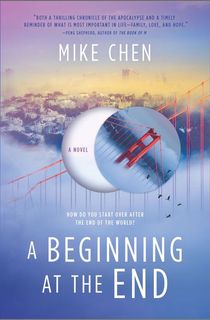Jamie loves his cat, memoirs, and coffee. He cleans when he’s stressed, and fantasizes about retiring in the Caribbean, away from the pressures of life in San Delgado. In other words, he’s an average guy—except for when he robs banks and rifles through other people’s memories.
Zoe has a food delivery job, a penchant for B-horror movies, and a relationship to alcohol that some might call problematic. (Not her; at least, not most days). She also has superhuman strength and speed, the ability to fly, and zero memories of who she was before she woke up in her dingy San Delgado apartment two years ago.
Jamie and Zoe are both ‘extraordinaries'—humans with secret, superpowered aliases.
As his alter-ego, the menacing ‘Mind Robber,’ Jamie robs banks and threatens to steal the memories of anyone who stands in his way.
Zoe, aka the Throwing Star, uses superhuman strength and speed to stop evildoers in their tracks. But sometimes that’s easier said than done — like when you’re responding hungover to a bank robbery, and the perp can stun people with a flick of his fingers.
When the extraordinary rivals meet outside of their costumes at a memory loss support group, a disaster makes them realize how much they have in common. Neither can remember who they were before they woke up in their respective, nondescript apartments two years ago, with pre-paid leases and mysterious notes hinting at their abilities.
RELATED: Mike Chen & Natalie Zina Walschots Unmask the Elusive Superhero Novel
Whenever he tries to explore his own memories, Jamie is overwhelmed by shame. By contrast, Zoe is desperate to know who she was before she became the Throwing Star. The supervillain and the superhero make a pact: Zoe will help Jamie complete one last, epic bank heist, and he’ll uncover who she really is.
But sometimes, the past is buried for a reason. When Jamie and Zoe explore the truth behind their isolated, amnesiac existences, they uncover an extraordinary conspiracy that reshapes their identities and tests their growing friendship.
Mike Chen is known for his previous novels Here And Now And Then and A Beginning at the End, each of which offer fresh and decidedly grown-up takes on classic SFF tropes. He’s also written for The Portalist about his love-hate relationship with canon; the importance of storytelling in video games; and what we can all learn from the 13th Doctor.
In We Could Be Heroes, Chen applies that pop-culture savvy and sense of humor to a story that’s both intimate and gripping. Despite their larger-than-life personas, Zoe and Jamie are instantly recognizable as real people (“I may rob banks, but I don’t have health insurance,” Jamie quips at one point).
And in Chen’s superhero world, ‘real’ doesn’t mean tortured, or boring. There’s no grimdark brooding in San Delgado, or thoughtless civilian casualties. Instead, ‘real’ means that Zoe and Jamie seem like your own friends, and that the stakes are meaningful even when the fate of the city doesn’t hang in the balance.
For instance, some of the novel's most compelling moments are when Jamie and Zoe wrestle inwardly with the risks of their new partnership. They each recognize that the other could destroy them with a wave of their hand, and that tension makes every time they team up more rewarding.
Of course, like any good superhero story, We Could Be Heroes is still action-packed. The moments in which Zoe uses her brute strength (honed by watching YouTube workout videos) to smash through concrete walls and punch dumpsters are particularly satisfying. Even Zoe and Jamie’s first official meeting, which begins as a discussion over how to use a coffee machine, evolves into an action sequence that would make Captain America or the Hulk proud.
However, We Could Be Heroes knows that emotional vulnerability can be just as nerve-wracking as a back-alley fight. That's particularly true when the book subverts our own expectations for Jamie and Zoe's partnership. We're used to superhero stories with a side of romance, after all, and Jamie and Zoe have a definite connection. However, Chen takes their affection for each other in an unexpected and much more rewarding direction.
Ultimately, We Could Be Heroes is also a mystery. Who were Zoe and Jamie before they lost their memories? How did Jamie get that scar on his palm? And what’s with the strange messages that keep appearing across San Delgado? This intrigue makes for a compelling whodunnit, one that also asks important questions about culpability and memory.
RELATED: 10 Questions for Writers to Ask When Post-Apocalyptic Worldbuilding
Zoe doesn’t think she can move on without first learning about her past. But for Jamie, the past is an unknown threat, one that he’s better off running from. Most of us can probably identify with both of those perspectives, which is part of what makes We Could Be Heroes such an addictive and relatable read.
Although Marvel or D.C. fans will definitely appreciate Chen’s odes to genre tropes, you don’t need to be a fan of superheroes to love We Could Be Heroes. Anyone who’s ever grappled with how their present is defined by their past, or with loneliness and isolation, will enjoy this story about ordinary people with extraordinary abilities.
Download We Could Be Heroes today!
This post is sponsored by MIRA Books. Thank you for supporting our partners, who make it possible for The Portalist to celebrate the sci-fi and fantasy stories you love.



